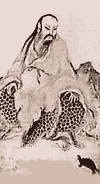
Fu Hsi
The History of I Ching is full of vital information to understand in depth the entire I Ching system. The ancient Chinese tradition also lasts in the present for its efficacy and importance but to use it to its full potential, read the I Ching origins. Maybe you weren't aware that I Ching goes back thousands of years and that its existence is attributed to a legendary Emperor who allowed his population to make use of important innovations such as the "Book of Change"....Who was that man? How did I Ching spread? Read the History of I Ching!
"I Ching", or the "Book of Changes" is the most read of the 5 Chinese classics. Tradition claims this book was written by the legendary Chinese emperor Fu Hsi (2953-2838 B.C.). I Ching may derive from a technique of ancient divination which goes back to approximately 5000 B.C. In the field of divination, this can be considered the most ancient book of all. Final comments have been added by King Wen and by the Duke of Chou in the 11th Century B.C.
According to ancient Chinese tradition, the inventor of the 8 trigrams (pa-kua) which represent the basis of the system of I Ching and from which the 64 hexagrams derive, was the first legendary Chinese Emperor (Fu Hsi) who ruled between 2852-2737 B.C. He invented many useful and innovative things like trawling, breeding silk worms and the opportunity to tame animals. The most important of his inventions is that of the 8 trigrams and the consultation of the Oracle through the yarrow stalks.
The second person who gave his contribution to the composition of the Book of Changes was Ching Wen. Known as the founder of the Chou Dynasty (1150-249 B.C.) and as a great writer, (his name means "Ching civility" or "Ching writing"), he introduced the 64 hexagrams, and their name is significant (T'uan text). Ching Wen wrote his book during the detention ordered by Hsin - the tyrant, subsequently dethroned by his son Wu. It was he who gave the name to the "Book of Changes".

Confucius
The draft of the Comments and partly also the Appendix of the Book of Changes have been attributed to Confucius (Kung Tzu, 551-478 B.C). At the age of 50, Confucius declared that if the Sky could give him another 50 years, he would devote it to the study of I- Ching and maybe then would learn to stay out of trouble. Confucius wrote 10 comments on this classic, called "The ten wings", transforming a text of divination into a masterpiece of philosophy.
From then onwards, the I Ching was the inspiration also for successive Taoists, like Chuang Tzu and Lao Tzu, and for various philosophers and scientists. The West got to know this extraordinary book in 1854, thanks to the translation by J. Legge.

 Ctrl+D to bookmark us
Ctrl+D to bookmark us